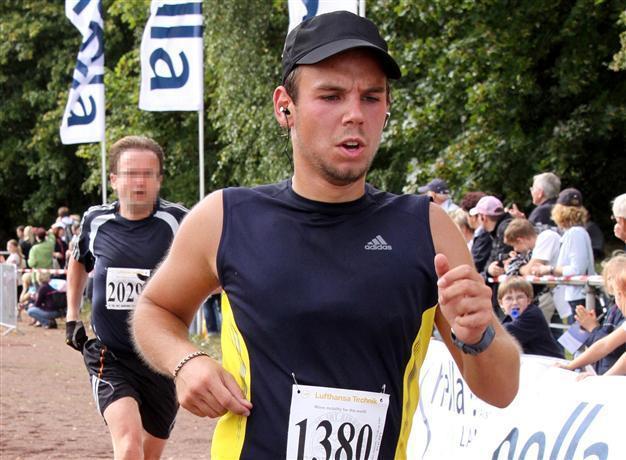Alps crash pilot's hidden illness sparks privacy debate
BERLIN - Agence France-Presse

Picture released on March 27, 2015 shows the co-pilot of Germanwings flight 4U9525 Andreas Lubitz taking part in the Airport Hamburg 10-mile run on September 13, 2009 in Hamburg, northern Germany. AFP Photo
Findings that the co-pilot believed to have deliberately crashed a Germanwings plane hid psychological problems from his employer prompted a charged debate in Germany on Monday on patients' right to privacy.
Still reeling from last Tuesday's disaster that killed 150 people, half of them German, many in the country asked whether the potential to neutralise threats to public safety should not trump doctor-patient privilege.
A transport policy expert from Chancellor Angela Merkel's Christian Democrats (CDU), Dirk Fischer, said physicians' strict confidentiality policy should be loosened when their patients work in sensitive fields.
Professionals such as pilots "should only see doctors designated by their employers," Fischer told the daily Rheinische Post.
He added that such doctors "should be relieved of their pledge of secrecy in communication with the employer and the aviation authority".
Member of parliament Thomas Jarzombek, also of the CDU, called for the creation of a commission of experts to study how to handle illnesses among those whose jobs mean they hold the welfare of many people in their hands.
German prosecutors said Monday that Lubitz had been diagnosed "several years ago" with suicidal tendencies and was still in treatment. Although his symptoms had abated, he was apparently written off sick on the day the Airbus crashed.
Media reports have indicated that Lubitz, 27, was taking medication for severe depression and was being treated for problems with his vision, possibly for a potentially career-ending detached retina.
Investigators evaluating voice recorder data say Lubitz remained silent and breathed calmly as he allegedly locked his captain out of the cockpit and slammed the plane into a French mountainside.
Carsten Spohr, the head of parent company Lufthansa, has said the airline was utterly unaware of any health issues that could have compromised Lubitz's fitness to fly, calling him "100-percent airworthy".
His professional performance and behaviour had never attracted cause for concern, Spohr added.
The German Medical Board has clear ethical policies on doctor-patient relations: "Doctors must remain silent about what is told to them in confidence or what they learn in their capacity as doctors."
It applies even after the death of a patient and includes keeping medical facts secret even from family members of the person in treatment, under penalty of up to one year in prison or a fine.
One exception, however, is when medical professionals have been excused from this duty by the patient, or when they have reason to believe that sharing their knowledge could prevent "a particularly serious crime" or a threat to someone's life.
A doctor is also obliged to come forward in cases of "psychiatric illnesses or a possible threat of suicide", member of parliament Karl Lauterbach, himself a physician, told the daily Bild. The American Medical Association has similar rules.
"When a patient threatens to inflict serious physical harm to another person or to him or herself and there is a reasonable probability that the patient may carry out the threat, the physician should take reasonable precautions for the protection of the intended victim, which may include notification of law enforcement authorities," it says on its website.
The German board's head, Frank Ulrich Montgomery, urged caution in reassessing the policy.
Patient privacy is a "cherished fact and, for all the citizens of Germany, a human right," he said.
"You can tell a society that cares about rules when it doesn't slip into hasty action-for-action's-sake. Or populism," weekly magazine Stern wrote in an editorial on its website.
"You can also tell a society that can handle the incomprehensible when it becomes clear it was a one-off case, extreme in every way. And, according to the rules of a humanitarian society, indeed -- as terrible as it is -- unpreventable."
The daily Die Welt noted a change in policy could have a chilling effect on people seeking the necessary treatment.
"Police also have the right... to a frank talk with a doctor without worrying that their employer will be told."
